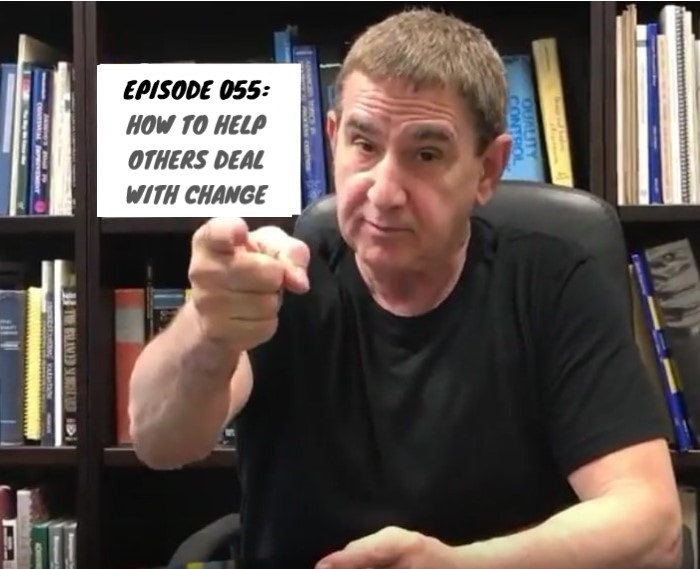This is How to Help Others Deal with Change
This week’s video is about helping others deal with change.
In other words, how much change can you put onto other people before they have emotional and/or economic problems?
Much of what I am going to cover in this video about how to help others deal with change is taken from a wonderful article by Carol Kinsey Gomen.
So here we go!
How can a person really understand his or her environment if he or she experiences significant change every two or three years?
Can you ever master the piano if the location of middle C is changed every 2 or 3 years?
Think of computer software that has frequent updates, and the ensuing difficulty in mastering the revised program
Change creates physical and psychological discomfort…
…that can cause anxiety, fear, depression, sadness, fatigue or anger; as well as physical symptoms such as headaches, stomach problems, and back problems, to name a few.
It’s no wonder that logic isn’t enough to get people to change.
So what’s a change agent to do?
Here are some methods to help others deal with change in their lives, and reduce the problems it may cause.
(1) Talk About Change to Demystify It
Continually talking about the change allows it to become less scary.
(2) Involve people in making the change that will affect them
No one likes a change that’s forced on them, yet most people respond favorably to change they help to create.
(3) Keep your communication about change simple
The brain can only deal well with a few concepts at a time. So, don’t lump everything about a change into one big chunk.
Rather, condense the change into two or three small sections that are easy to digest.
This is called the strategy of involvement in management.
(4) Help people pay attention
The act of paying attention helps to reshape brain patterns. Concentrating attention on a thought, or on an insight, or a fear, will over time, keep the brain stable which will create physical links in the brain’s structure.
High attention facilitates long-term behavioral change in the brain. One way to encourage people to pay attention to new ideas is to continually repackage the ideas in entertaining and actionable ways.
Like we do at Prime Your Pump!
Use It or Lose It – Helping Others Deal with Change
(1) Talk about change to demystify it.
(2) Involve people in making the change that will affect them.
(3) Keep your communication about change simple.
(4) Help people pay attention.
When to Use It:
You can use the material in this video whenever you have to create change for others.
What Do You Think?
Do you think this post on change will make change more comfortable for you? If yes, please let us know why in the comments below. Also, if no, please let us know why in the comments below.
Until next time, behave and as always…Prime Your Pump!
–Howie
If you enjoyed this post, it would mean the world to us if you shared it with people you care about via any of the social media platforms below!
Popular Previous Posts:
Managing Yourself: Advice from the Great Peter Drucker
How Many of These 5 Essential Questions Do You Ask?
3 Quick Ways to Become a Talent Magnet!
So, Do You Have a Fixed or Growth Mindset?


Life is changes. Positive changes are welcome and easy to deal with. You are correct in saying that negative changes are often accompanied by fear and other unpleasant responses . Negative perceptions need to be turned around to a positive mindset. As you suggest , this requires a focused mindset and communicating with others who might be affected by the change.
“Change is not necessarily progress.” I originated this thought many years ago, I know that it was true then, and is still true today. If more senior corporate big-wigs used your ideas of how to minimize the impact of change, implementation would be much smoother and with less resistance. When I worked at the Air Force Flight Test Center, it became easy to predict when change would occur – each time a new commanding general took over. This happened about every two/two and a half years. Each incoming general implemented a Center-wide reorganization. The new general had to prove to his superiors at the Pentagon that he was improving the managerial process to increase efficiency and/or to reduce costs. Us grunt peasants at the low levels just continued in our jobs, realizing that as far as we were concerned, all this meant that somewhere up the organizational food chain there would be a different colonel who our boss reported to. I think I survived three or four such “reorganizations” without any impact on myself or my co-workers. To put it another way…”If it’s not broken, don’t fix it”.
Personal change is a different story. People change jobs, move to a different city, have to search for a new house, kids have to adjust to a new school, stuff like that. Situations like this create personal stress. Best to talk it out with your SO, preliminary agreement is necessary, knowing that some modifications will happen. We made our “big move” when our daughter was eight, she took it quite well. Kids at that age are flexible. We, on the other hand, needed about a year to fully acclimate. But we were prepared and survived, making a few trade-offs. Somehow I think we used your four points without even knowing it. Does that make us psychic?